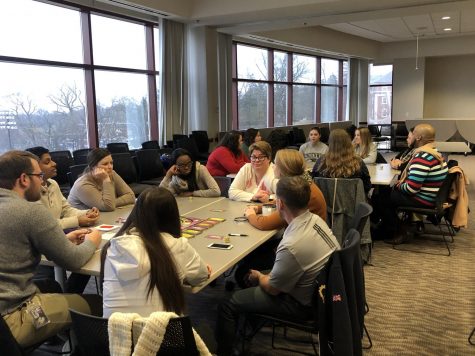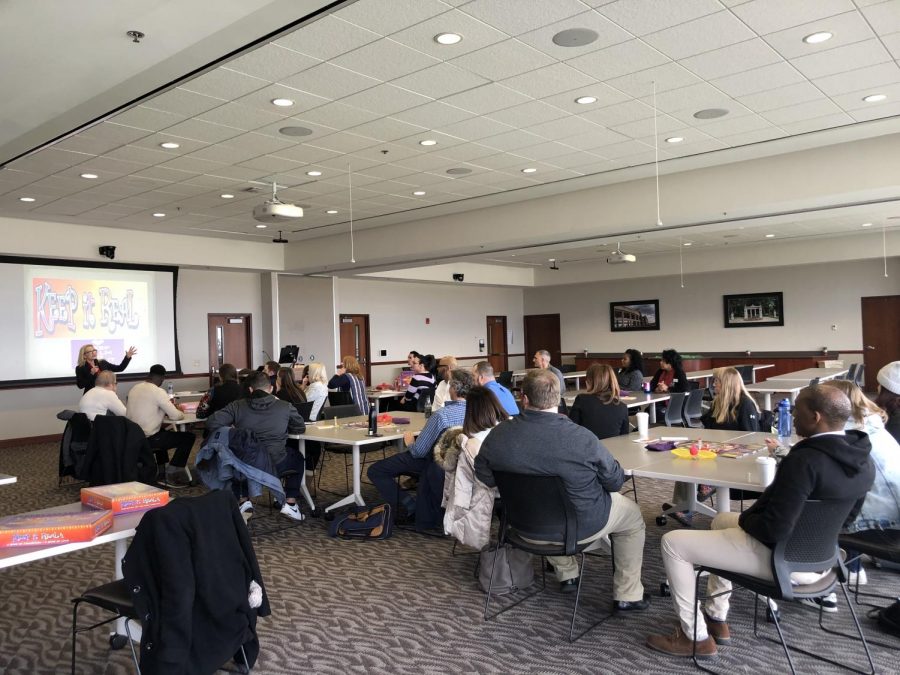Opinion: Beyond the transcript: diversity events and guest speakers
A “Keeping It Real” event centered around the board game “Keep It Real” and discussions about bias and inclusion. Leslie Robinson, the psychotherapist who created the board game, led the session.
Photo provided by Shane Williamson, dean of students and chief diversity officer.
February 20, 2020
Anna Reynolds (she/her/hers) is a senior at Lindenwood earning a double-major in History and Political Science and a minor in Gender Studies.
Last week, I attended Lindenwood’s second annual “Keeping it Real” session. These sessions, which are centered around a board game, create a safe place for students, staff, and faculty to get to know each other, but also to understand their own implicit biases.
At the end of the session, Director of Student Involvement Angie Royal turned to me, as I was one of the few students who attended the session, and asked “Anna, how can we get more students to attend these events?” I immediately came up with a few suggestions off-hand that I thought might increase student attendance. However, Angie’s question stuck with me as I went about my evening, and I wondered, why was it that I was often one of the only students present at these on-campus training sessions?
It finally dawned on me that in order to reframe the college experience to include things like “Keeping it Real” sessions and guest lecturers on campus, students would need to step outside of themselves. It is so easy to forego participation in an activity if it isn’t pertinent to your major, or your professor doesn’t offer extra credit (don’t come for me – I love extra credit too!). But, in my four years at Lindenwood, I have learned that the most valuable experiences are often those which may not benefit you on paper.

Photo provided by Shane Williamson.
I cannot stress enough that it is an honor and a privilege for each of us to care about the opportunities provided to us by Lindenwood University. I’m sure your professors have imparted upon you that you and you alone are responsible for your education. But that doesn’t stop when you walk out of the classroom. Lindenwood’s campus is overflowing with opportunities to hear guest lecturers from every discipline speak on just about every topic under the sun. In my time here, to name a few lectures I have attended for my own enjoyment, I heard St. Louis County Prosecutor Wesley Bell speak on race and criminal justice reform, and I had the privilege of hearing a Holocaust survivor share his story. The latter experience would inspire me to eventually pursue an internship at the St. Louis Holocaust Museum and Learning Center, after which I would host my own speaker event at Lindenwood.
The likelihood that you will ever again in your lifetime have open, unlimited access to a diverse array of renowned expert speakers at zero cost is exceptionally low. This is why I feel such immense gratitude for the staff and faculty who facilitate these guest lecturers. Learning need not and should not end at the classroom door.
Beyond the guest lectures, Lindenwood’s Center for Diversity and Inclusion and Diversity, Equity, and Inclusion Task Force, provide us as students countless opportunities to become better citizens. Multiple times each semester, Safe Zone and Safe Zone 2.0 trainings teach students, staff, and faculty how to be better allies and create inclusive spaces for the LGBTQ+ community. Implicit bias training, also offered multiple times a semester, helps individuals understand and tackle their subconscious biases to create more inclusive spaces for every person from any background. Additionally, the DEI taskforce hosts speaker series and events which help navigate difficult, yet socially relevant topics such as “How to be an Ally.”
Each of these trainings are at most two hours out of your day. But still, because we don’t see the results of these trainings manifested in our GPAs or stamped on our transcripts, we rationalize that they aren’t worth our time.
But did you really go to college to earn a transcript, or even a diploma? There’s nothing wrong with striving for academic achievement, but as you grow throughout your life, no one will be able to tell what grade you earned in your Intro to Economics course.
People can, however, assess your teachability, your adaptability, your compassion, and your willingness to stand up for what’s right in the face of adversity. None of these skills can be found within the pages of a textbook. Take advantage of these events which provide you the tools to build a skill set that will carry you well beyond your time at Lindenwood University.
The best thanks you can offer the outstanding staff and faculty who take the time to regularly facilitate these trainings, is signing up for one.
Ultimately, fellow students, you are in charge of your college experience. But what’s perhaps more important, is that you are in charge of your future. How do you want to be remembered? What kind of legacy do you want to leave behind? Is it one of advocacy, compassion, and action on behalf of others? Maybe it’s one of taking advantage of every opportunity that comes your way. Or maybe, you simply want to be remembered for being kind.
Take the reins of your future and make the choice today to make time for a Safe Zone training or a Speaker Series. No, it won’t end up on your transcript, but you’re not here to create a transcript. You are creating yourselves.








